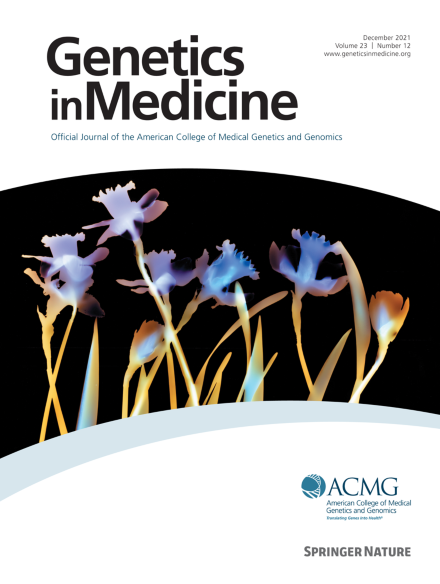对受遗传性癌症综合征影响的家庭进行决策辅助的结果和有效性:一项范围综述。
IF 6.6
1区 医学
Q1 GENETICS & HEREDITY
引用次数: 0
摘要
目的:在过去的 15 年中,人们开发了许多决策辅助工具(DAs),以帮助受遗传性癌症综合征影响的家庭在管理遗传和癌症风险方面做出决策。我们确定了DAs的范围和特点,重点关注其根据指南建议所处的发展阶段、结果和有效性:我们在 MEDLINE、EMBASE、Cochrane、CINAHL 和 PsycINFO 中进行了全面检索,并进行了人工检索。符合条件的文章报道了为受遗传性癌症综合征影响的家庭提供支持的DAs,这些文章均以英语发表,时间从开始到2024年7月。采用混合方法评估工具(Mixed Methods Appraisal Tool)对文章质量进行评估:从 15,066 条记录中,确定了 32 项存在中度偏倚风险的研究,报告了 23 项独特的 DAs。大多数DAs针对的是北美(73.9%)和欧洲(81.3%)患有遗传性乳腺癌和卵巢癌综合征的女性(69.6%),主要支持癌症风险降低策略(56.5%)和基因检测/咨询(47.8%)的决策。只有四项 DA 符合指南推荐的开发流程,包括原型开发、alpha 测试和 beta 测试。开发和 alpha 测试结果包括用户体验、可理解性和心理影响。Beta 测试评估了决策能力、决策过程的质量、心理影响以及对决策的影响。DAs持续提高了决策能力和决策过程的质量,但在风险管理中对心理结果和实际决策的影响各不相同:结论:根据指南建议的开发流程,针对遗传、种族或性别少数群体的 DAs 开发不足。未来的研究应针对更广泛的人群开发DAs,并明确其有效性,尤其是在心理结果方面。本文章由计算机程序翻译,如有差异,请以英文原文为准。
Outcomes and effectiveness of decision aids for families affected by hereditary cancer syndromes: A scoping review
Purpose
In the past 15 years, numerous decision aids (DAs) have been developed to assist families affected by hereditary cancer syndromes in decision-making for managing inheritance and cancer risk. We identified the range and characteristics of DAs, focusing on their development stage according to guideline recommendations, their outcomes, and effectiveness.
Methods
A comprehensive search was conducted in MEDLINE, EMBASE, Cochrane, CINAHL, and PsycINFO, along with manual searches. Eligible articles reported DAs for supporting families affected by hereditary cancer syndromes, published in English from inception to July 2024. Quality was assessed using the Mixed-Methods Appraisal Tool.
Results
From 15,066 records, 32 studies with a moderate risk of bias, reporting 23 unique DAs, were identified. Most DAs targeted women (69.6%) with hereditary breast and ovarian cancer syndrome (73.9%) in North America and Europe (81.3%), primarily supporting decisions on cancer risk-reduction strategies (56.5%) and genetic testing/counseling (47.8%). Only 4 DAs were consistent with guideline-recommended development process, including prototype development, alpha- and beta-testing. Development and alpha-testing outcomes included user experience, understandability, and psychological impact. Beta-testing evaluated decision-making capacity, quality of the decision-making process, psychological impact, and impact on decisions. DAs consistently improved decision-making capacity and quality of the decision-making process but showed variable effects on psychological outcomes and actual decision in risk management.
Conclusion
DAs are underdeveloped for genetic, racial, or gender minorities, according to guideline-recommended development process. Future research should develop DAs for broader populations and clarify their effectiveness, particularly regarding psychological outcomes.
求助全文
通过发布文献求助,成功后即可免费获取论文全文。
去求助
来源期刊

Genetics in Medicine
医学-遗传学
CiteScore
15.20
自引率
6.80%
发文量
857
审稿时长
1.3 weeks
期刊介绍:
Genetics in Medicine (GIM) is the official journal of the American College of Medical Genetics and Genomics. The journal''s mission is to enhance the knowledge, understanding, and practice of medical genetics and genomics through publications in clinical and laboratory genetics and genomics, including ethical, legal, and social issues as well as public health.
GIM encourages research that combats racism, includes diverse populations and is written by authors from diverse and underrepresented backgrounds.
 求助内容:
求助内容: 应助结果提醒方式:
应助结果提醒方式:


